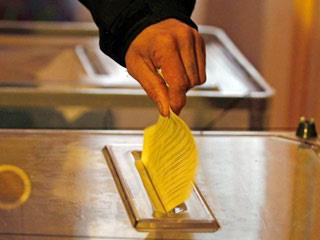Our colleague Martin Banks was election monitor of the Crimea referendum on March 16. In this article he reports about the pressconference of the election monitors after the referendum

As ethnic Russians continued their celebrations across Crimea on Monday, Sroja Trifkovic, a Chicago-based Serb-American, "It is ironic that we have seen the Russian President upholding the principles of self-dertermination while the West,including the EU, seems to have been upholding the legacies of the Soviet past."
by
Martin Banks
Speaking in Simferopol, the administration capital of Crimea, several members of the 168 monitors who tracked the referendum said they had found no evidence of irregularities or intimidation towards ethnic Ukrainians.
They were speaking at a news conference on the day the European Union said it will threaten Russia with a new cold war and a "far-reaching" economic blockade if Vladimir Putin annexes Crimea.
EU foreign ministers met in Brussels as Crimea's parliament formally declared independence from Ukraine and asked to join the Russian Federation.
The move follows Sunday's referendum in 97 per cent of Crimeans voted to break away from Ukraine to join Russia, according to official results. Soon after the vote was announced, Crimea said it was declaring formal independence from Ukraine.
Addressing a packed news conference, one of the monitors, Johan Backman, from Finland, said, "What I saw on Sunday was well organised and I witnessed no violations at all.
"The referendum was, as far as I am concerned, within the framework of international law and was simply a case of the Crimean people exercising their right to vote to determine their future," added Backman, a professor of sociology and law at the University of Helsinki.
His comments were echoed by another monitor, Tasheva Magdalena, from Bulgaria, "The only thing I detected was a sense of joy and elation on the part of those who came out to vote. The referendum was organised well and despite being told to boycott the exercise, people from ethnic Ukrainian background also cast their vote.
"I have of course seen the reports in the media about intimidation and threats of violence towards ethnic Ukrainians in the run up to the referendum. But I heard no one at all complain about any such things taking place. Nor did I see any evidence of it."
As ethnic Russians continued their celebrations across Crimea on Monday, Sroja Trifkovic, a Chicago-based Serb-American, "It is ironic that we have seen the Russian President upholding the principles of self-dertermination while the West,including the EU, seems to have been upholding the legacies of the Soviet past."
Trifkovic, foreign affairs editor of Chronicles Magazine, added, "What the Crimean people have been doing is reacting to the current chaos in Kiev."
He also warned of the possible consequences of the sanctions approved on Monday by the EU, saying, "If Russia decides to retaliate do not be surprised if, tomorrow, gas supplies to Europe dry up and people are left in the cold.
"The result of the referendum could well result in regions in East Ukraine seeking self governing status. If those in West Ukraine do not like this it might well result in the total disintegration of the country."
He said, "However, what we all need to do now is move on from this and look to the future.Putin should tell the West to stop its obsession with Crimea."
Another of the monitors, who came from 68 different countries, was Igor Morozov, a Russian Senator, who declared, "It is likely that later this week the Russian Federation will formally introduce a new law which admits Crimea to Russia. After it has been enacted, Crimea will become a full member of the Russian Federation."
Some ethnic Ukrainians said that while were disappointed with the outcome of the poll, they accepted the result.
An elderly woman in the coastal town of Evpatoria, who was mingling happily with celebrating ethnic Russians, said she had voted in favour of staying with Ukraine and against joining Russia.
She said, "I am naturally saddened by the result but I accept it because it is the verdict of the overwhelming majority of the people here. We have to accept this now and try to move on. I have no problem with that and others should do the same."
Meanwhile, Germany’s former chancellor Gerhard Schroeder has staunchly defended Russia's actions in the Ukraine and claimed that Russia wanted to stay “big and strong” and an equal to the United States.




 By: N. Peter Kramer
By: N. Peter Kramer
